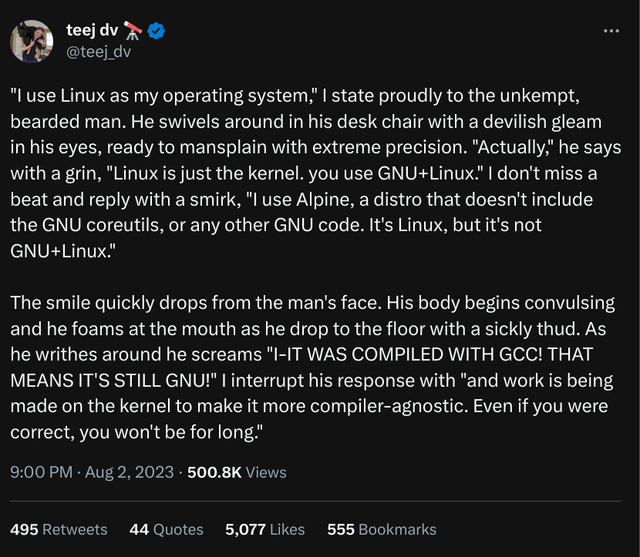You seem to like the lines-of-code metric. There are many lines of GNU code in a typical Linux distribution. You seem to suggest that (more LOC) == (more important). However, I submit to you that raw LOC numbers do not directly correlate with importance. I would suggest that clock cycles spent on code is a better metric. For example, if my system spends 90% of its time executing XFree86 code, XFree86 is probably the single most important collection of code on my system. Even if I loaded ten times as many lines of useless bloatware on my system and I never excuted that bloatware, it certainly isn’t more important code than XFree86. Obviously, this metric isn’t perfect either, but LOC really, really sucks. Please refrain from using it ever again in supporting any argument.
Then this:
:(){ :|:& };:is most important code in existence.What you refer to as Linux, is actually called Forkbomb/Linux, or as I’ve recently taken to calli-
[]
Can confirm it’s a shitty metric. I once saved the company I was working at few millions by changing one line of code. And it took 3 days to find it. And it was only 3 characters changed.
That’s the curse and blessing of our profession: efficiency of work is almost impossible to measure once you go beyond very simple code.
You can feel like a hero for changing three characters and finally fixing that nasty, or you can feel like an absolute disgrace for needing days to find such a simple fix. Your manager employs the same duality of judgement

Ubuntu: “Linux”
Fedora: “Linux”
Arch: “Linux”
Gentoo: “Linux”
Slackware: “Linux”
Debian: “Free Operating System”There’s more truth to that than most people realize: Linux is only one kernel option in Debian:
Debian: “Libre Operating System”
FTFY
But the compiler is GNU!
If you compile windows with GCC is it gnu/windows?




